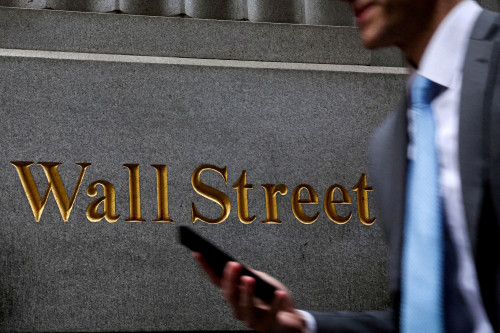NEW YORK (Reuters) -Wall Street’s main indexes pared losses after being weighed down by technology stocks earlier Friday, while Federal Reserve officials cast doubt on a potential interest rate cut in December.
Concerns about stretched AI stock valuations have triggered declines in recent weeks, putting the Nasdaq on course for its longest losing streak since April.
The Dow Jones Industrial Average fell about 0.6% in morning trading in New York, while the S&P 500 was broadly unchanged. The FTSE 100 slid more than 1%.
Expectations for a 25-point rate cut in December fell to 53% from last week’s 67%, according to CME Group’s FedWatch tool, after policy makers expressed reticence on more monetary easing.
QUOTES:
MARK MALEK, CHIEF INVESTMENT OFFICER, SIEBERT FINANCIAL, NEW YORK:
“We may have seen a bit of sellers’ remorse here from people who sold their high-flying tech stocks and then started looking around for cheap quality stocks only to conclude that hey, maybe we jumped the gun a little bit here, nothing has really changed with Google, or Meta or these guys. You can’t convince me that Meta is a value play, but it was less expensive at the open than in was at its peak. So, these stocks had not been hammered down for the right reasons.”
MICHAEL MCGOWAN, MANAGING DIRECTOR OF INVESTMENT STRATEGY, PATHSTONE, BOULDER, COLORADO
“The market certainly has some froth both in terms of valuations and expectations. We have passed through the core of earnings season, and we saw a lot of companies beating earnings but we’re not seeing great price returns, so I think this is just a little bit of air coming out of the balloon.
“We’re definitely seeing some signs of some froth and exuberance in markets and so anytime we see a little bit of negative indication on the headlines we’re going to see these little mini pops like we’re seeing here.
“I hesitate to call this a bubble just because valuations in a true bubble would be quite a bit wider, I think. But I think we’re at a point where (AI) capex is becoming scrutinized more.
“There’s a healthy skepticism coming into the market and you could certainly see that continue to play out a little more.”
OHSUNG KWON, CHIEF EQUITY STRATEGIST, WELLS FARGO, NEW YORK:
“We are bullish. Sentiment has gotten too negative, in our view, triggering a contrarian Buy signal in our sentiment indicator. Historically after Buy signals, the S&P 500 rallied 7.5% over the subsequent three months, being positive 90% of the time.
“There is froth and valuations are high, but valuation is only half the equation. The other half of EPS growth. As long as EPS continues to grow stronger than it historically has (we’re forecasting +10% in 2026-27E), equities should continue to do well. We don’t think it’s a bubble.”
ADAM HETTS, HEAD OF MULTI-ASSET INVESTING, JANUS HENDERSON, DENVER:
“Investors are looking to avoid whiplash right now, which is what happens when markets are richly valued. This creates the kind of market fragility that can lead to big down days or blistering rallies.
“The market has been driven by short-term sentiment rather than a medium narrative… I think there will be more of a focus on strategies and names, and less on short term noise.
“We’ll stop talking about the shutdown, which was very short term, or pessimism about a December rate cut by the Fed, and instead focus on the fact that we have a very accommodative administration and an accommodative monetary regime. U.S. GDP is still running strong, corporate earnings are still growing at above trend rates and the AI story is a longer-term secular tailwind.”
SIMEON HYMAN, HEAD OF INVESTMENT STRATEGY GROUP, PROSHARES, DEMAREST, NJ:
“The Fed isn’t going to be either a drag on stocks but it also wouldn’t give valuations a real boost even if we had a rate cut next month. The next piece of the puzzle I think people are a little too cavalier about is relative valuation. People talk about the largest companies being cheap relative to the market, but the reality is that that kind of a relative discount may not be enough. Those megacaps are all trading at much higher levels than they have historically.
“But on company fundamentals and earnings, the story is good. Any broadening in the market has to come from those broadening, and I think we saw that happen in the third quarter. I expect it will hold up through the end of the year.”
CHRISTOPHER MURPHY, CO-HEAD OF DERIVATIVES STRATEGY AT SUSQUEHANNA, PENNSYLVANIA
“Today’s sell-off was led by high beta and speculative tech, with the ARKK (ARK Innovation ETF) complex among the worst performers.
“The move was exacerbated by a sharp drop in December rate cut odds, slipping from 65% to 50%, which added pressure across growth-oriented sectors.
“Despite the volatility surge, this appears more like a temporary derisking or rotation phase ahead of the next key catalyst–NVIDIA’s upcoming earnings—which will likely dictate sentiment for AI-linked leaders and the broader market.”
BRIAN MULBERRY, SENIOR CLIENT PORTFOLIO MANAGER AT ZACKS INVESTMENT MANAGEMENT, COLORADO
“The recent volatility seems heavy right now, but over the last 30 days, the S&P 500 is still +1.2%. That said, there is a definite rotation happening as mega cap tech stocks are unwinding some of their lofty gains, and investors seem to be moving back into more value-oriented names.”
“It is a good thing to see more broadening in the market as it has been so concentrated on the AI trade for the past year. Investors are beginning to ask questions around the lofty CAPEX spending, mainly wanting to see how and when this spending will come back to the balance sheet and will it be profitable. This is the main driver of the selling pressure, the concentration of returns built up by the Mag 7 names adds to the drawdown simply because of their weightings now in the S&P 500.”
SEEMA SHAH, CHIEF GLOBAL STRATEGIST, PRINCIPAL GLOBAL INVESTORS, LONDON:
“Markets are getting a view that the labour market is slowing down. But because the Fed doesn’t have enough confidence in the alternate data, they would rather still hold.
“You have markets that are concerned about the growth outlook. If the data is correct in the way it seems to be trending, the economy does require rate cuts.
“This is where, for the first time, the government shutdown really does have a sustained impact on the economy.
“So, we just have to see if that data is going to come through. It always makes sense for the Fed to step in ahead of time.
“The lack of a Fed cut in December would be quite negative. And we would expect that the market would continue to respond quite negatively until we get an indication that a Fed rate cut is coming.
“We are overall overweight in equities.”
BILL FITZPATRICK, MANAGING DIRECTOR AND PORTFOLIO MANAGER AT LOGAN CAPITAL MANAGEMENT, CHICAGO:
“There’s a bit of a natural unwind in that valuations were a bit lofty in some of the big tech names, and you had a few large investors lightening up on their positions. I think it just speaks to the point that the starting point does matter and these are terrific companies, their stock price has performed very well and to get a bit of a rotation is not too surprising.
“The hope is that instead of a bubble mentality, we just get a broadening-out of some of the leadership. Some of the more stable sectors that have not participated the last couple of years are starting to gain more recognition and perhaps we’ll see some more stable sectors do well.
“Investors should be continuing to diversify their portfolio away from the one sector that has been driving the bus for so long. The message is to continue to diversify broadening-out the leadership. The timing of this sell-off or unwind is going to be too difficult to gauge.”
MATTHEW PALLAI, CHIEF INVESTMENT OFFICER AT NOMURA CAPITAL MANAGEMENT, NEW YORK:
“I don’t think this is a bubble, so to speak, either in credit or on the equity side. However, I do think there is a significant amount of liquidity that has been out there in the market and that is driving both.
“It has driven credit spreads to fairly tight levels in several but not all credit markets, and some widening is probably healthy for the market at the moment, given the fact that in the macro backdrop there’s more uncertainty now around things like unemployment and tariffs and geopolitics.
In equities, “markets have done well for a fairly long period of time now… it’s healthy to have some correction from those levels, especially if it’s on the backdrop of more uncertainty in the macro environment.”
(Reporting by Suzanne McGee, Davide Barbuscia, Saeed Azhar, Akriti Shah, Dhara Ranasinghe and markets team, compiled by Lananh Nguyen; Editing by Nia Williams)






